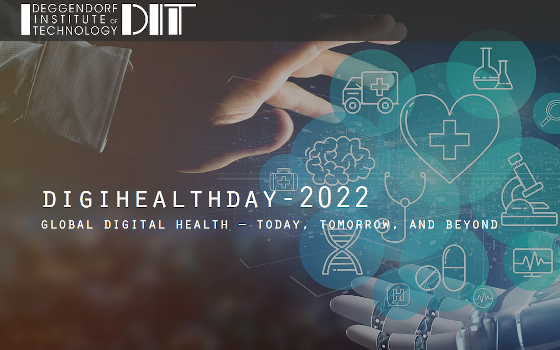On Friday, 11 November, 2022, the third edition of the International Symposium DigiHealthDay, will be hosted by the European Campus Rottal-Inn of Deggendorf Institute of Technology (DIT-ECRI). The Premier Sponsor of this year's event is SHL Telemedicine.
The series is endorsed and supported by: Bavarian State Ministry of Health and Care (StMGP), Healthcare Information and Management Systems Society (HIMSS), International Society for Telemedicine & eHealth (ISfTeH), Consortium of Educational Institutions in Digital Health (CONEDIG), International Medical Informatics Association (IMIA), European Federation for Medical Informatics (EFMI), German Society of Digital Medicine (DGDM), German Telemedicine Society (DGTelemed), Bavarian Telemedicine Alliance (BTA), Armenian Association of Digital Health (AADH), City of Pfarrkirchen, Russian-Armenian University (RAU), People’s Friendship University of Russia (RUDN), National Healthcare University of Ukraine (NHU), DigitalHealthNews.eu (media partner) and Munich Digital Health Summit (Partner event).
The Symposium will begin with the welcome address by honorary Klaus Holetschek - the Bavarian State Minister of Health and Care, and other dignitaries; followed by plenaries, scientific and special sessions, and a panel discussion. Check the official website for the Preliminary Program.
Distinguished Speakers at the DigiHealthDay-2022 include Prof. Bernd Blobel, Dr. Ryan Alistair Dos Santos (WHO Regional Office for Europe), Dr Anne Snowdon (HIMSS Analytics), Prof. Sarah Wamala Andersson, Prof. Rajendra Gupta, Dr. Georg Münzenrieder, and Mr. Artur Olesch.
Prime academic focus for DigiHealthDay-2022 is AI research, ethics and regulation. An exclusive Erasmus+ Blended Intensive Programme titled "Explainable and Ethical AI in Healthcare" will be conducted jointly by by Deggendorf Institute of Technology, University of Agder, Aalborg University, and Luleå Technical University as pre-meeting workshop (follow this link for details) is this year's highlight event.
Adding to the theme is a special panel discussion, "DigiHealth‐AI Quo Vadis: How to Make AI Safe, Efficient, Ethical, Explainable, and Accountable?".
Make your work visible with a scientific contribution that will be published jointly by DIT's Journal of Applied Interdisciplinary Research (JAIR) and the Ukrainian Journal of Medical Informatics and Engineering. In addition to other Digital Health Topics a preference is given this year for AI research, ethics and regulation, pragmatic research in digital health, and digital health education. Submission deadline was extended to November 1. See here for details.
Scientific Session, EFMI Session, and Student Session are hosted parallel. Speaking at the EFMI Session are Dr. Lars Lindsköld and colleagues. In the Scientific Sessions, selected academic papers in Digital Health will be presented. The Students Session is the stage for recognising sprouting talents.
DigiHealthDay @ DIT-ECRI, is one of its kind event series, to learn from and meet academic, scientific, regulatory, payer and industry experts in Digital Health from around the globe. The DigiHealthDay-2022 will be hosted in HYBRID mode (on-site and live-streamed) and the registration is free-of-charge.
Please register here, if you have not already, and make sure you don't miss this opportunity to be part of a distinctive, vibrant and diverse Digital Health community. There are only limited seats available for physical attendees. Kindly indicate your intentions to join us physically before November 1 by sending a blank email with a subject line "ONSITE" to
For further information and to register, please visit:
https://www.th-deg.de/digihealthday
The faculty European Campus Rottal-Inn (ECRI) is a semi-autonomous branch of the Deggendorf Institute of Technology (abbreviated to DIT. In German the DIT is titled THD - Technische Hochschule Deggendorf, a university of applied sciences in Bavaria). ECRI was established in 2015 as a cross-disciplinary educational institution preparing multilingual, global graduates for international careers in applied healthcare and technical sciences. ECRI offers two full-time study programs in the field of Healthcare Information and Communication Technologies: Bachelor of Health Informatics, and Master of Medical Informatics, both taught in English, targeting not only local but primarily international students.
ECRI is located in the district centre Pfarrkirchen, in the region of Lower Bavaria (South-East of Germany). It is a charming touristic town, nestled among rolling, picturesque hills, close to the Austrian border and only one hour's drive away from Deggendorf. Attractive cities nearby are Salzburg, Regensburg and Passau, and Munich is just a 90-minute drive away. The proximity to Austria and the Czech Republic puts the district in the heart of Europe. Pfarrkirchen has excellent school and education facilities, and offers many leisure activities. In the recent years Pfarrkirchen has become culturally renowned in the area due to its exceptional art exhibitions, museum nights and numerous festivals and events throughout the year. In the summer, the old town festival tempts thousands of visitors with its multicultural culinary and musical events.
The Deggendorf Institute of Technology (DIT) strives for academic excellence and ranks among the best universities of applied sciences in Germany. Founded in 1994, it is a young, modern and excellently equipped university offering relevant and practical courses set in a friendly, relaxed and safe environment. DIT supports its students with many facilities, such as student clubs, a sports programme, an international office, career services and child care centre. It is the perfect environment for students to shape their futures and move forward into academic success.
